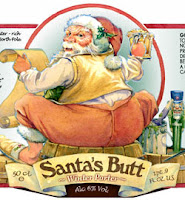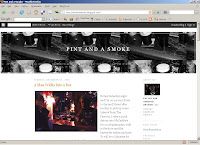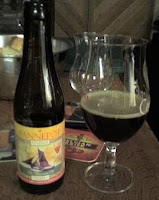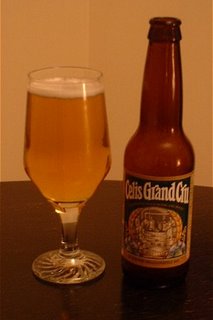This article was originally written in July 2006 for the now-defunct food and drink website Gremolata. It was re-published here in September 2011, but back-dated to appear in the blog archives close to its original publication date.
In my previous post, I had a look at the fruit beers featured in the LCBO’s summer beer release – Belhaven Blueberry, Floris Ninkeberry, Liefmans Frambozenbier and St. Louis Premium Kriek – plus the honey-flavoured Fuller’s Organic Honey Dew. As with all LCBO seasonal beer promotions, they are only available at selected stores in a limited quantity, so if you have a taste for fruit beers and want to know your year-round options, here’s a handy guide to what’s available on LCBO and Beer Store shelves and at local breweries on a more regular basis:
Amsterdam Framboise ($2.60/341 mL, 6.5% abv, available at the brewery)
The beer that comes alphabetically first on this list also happens to be the best fruit beer currently being produced in Ontario. Amsterdam Brewing takes the tough road to brew this one, using whole raspberries rather than juice or extracts, and adding them during a second fermentation process rather than just adding the flavour to a finished beer. The bright ruby-pink colour may be a bit shocking and suggestive of sweet fruit soda, but the aroma and flavour both exhibit a fresh raspberry character that holds a perfect balance of sweet and tart notes. The result is a fantastically refreshing beverage that pairs well with desserts, or simply as a thirst-quenching sipper. The only bad thing about this beer is that it is usually only available at the brewery (21 Bathurst St. at Front), although it sometimes appears at the LCBO in a unique ceramic jug ($10.95/750 mL, LCBO 637769).
Belle-Vue Kriek ($3.30/375 mL, 5.2% abv, LCBO 487231)
Founded in 1913, Brasserie Belle-Vue is probably Belgium’s best known maker of fruit beers, mainly thanks to the fact that they have been owned for a number years by the multi-national brewing conglomerate InBev. There are some who claim that the Belle-Vue beers have been dumbed down in the years since the InBev buyout, with the rough, tart edges being smoothed and sweetened to appeal to a larger range of customers. Perhaps that is the case, but at its core, Belle-Vue Kriek is still a very traditional beer. In his excellent book Microbrewed Adventures, beer writer and homebrewing legend Charlie Papazian reports on a visit to the Belle-Vue facility where he saw their Kriek being brewed by adding whole cherries to barrels of young lambic, a unique Belgian beer that is produced by spontaneous fermentation – the brewing vats are left open and exposed to bacteria and wild yeasts, a process that imparts the beer with a distinct dry, sour and vinous character. The fruit-laden lambic is left to ferment for a couple of years before being prepared for bottling, during which is it likely that further fruit juice and sugars are added to sweeten the mixture. The result is a bright ruby beverage that holds hints of it’s pedigree in the slightly tart aroma and flavour, but which is ultimately too sweet and cloying, at least to my palate. The finish is especially unappealing, with the sweet and tart notes clashing to a produce a vaguely medicinal flavour that is not unlike cherry cough drops.
Brick Bambay ($8.95/6 x 341 mL, 2.5% abv, LCBO 679357)
In a recent newspaper article, the founder of Waterloo’s Brick Brewery, Jim Brickman, referred to Bambay as “breakfast beer”. It may be a strange description, but Bambay is a strange beverage. Most juice-based fruit beers tend to be blended at a ratio that allows the drink to still be clearly identifiable as a beer, just one that happens to have some fruit flavour added. But Bambay is a 50/50 blend of beer and citrus juice (oranges, grapefruit and key lime), and the result is a concoction with half the alcohol and none of the flavour of a beer. That’s not to say it’s a bad beverage, as it’s actually quite tasty, and would appeal to folks who enjoy Ting and other citrus drinks. But if you’re in the mood for a beer – even a fruit flavoured one – this probably isn’t the drink for you.
Fruli Strawberry Beer (2.10/250 mL, 4.1% abv, LCBO 698548 & Beer Store)
If you’re looking for Fruli in one of the self-serve Beer Store locations, you will find it shelved next to the malt-based alco-pops like Dave’s Spiked Lemonade and DJ Trotters Sex On The Beach. It may seem strange to see a Belgian fruit beer racked next to such low-rent sugar bombs, but once you’ve tasted it, you’ll understand why – ’cause DAMN, this stuff is sweet! If you’ve ever had sickly sweet strawberry freezer jam, you’ll instantly recognize both the taste and flavour of this beer. There’s a bit of tartness in the finish, but not enough to cut the sugary strawberry candy notes that predominate. I’ve been told that this pairs well with rich desserts like chocolate cake, but I was barely able to get half a bottle of this down on its own, so I won’t be rushing to get another bottle to experiment with.
Kawartha Lakes Raspberry Wheat ($11.25/6 x 341 mL, 4.5% abv, LCBO 698498 & Beer Store)
Back when Kawartha Lakes Brewery was still based in Peterborough, this beer was a summer favourite of mine. The base beer was a crisp, refreshing golden ale with a hint of wheat, and the raspberry extract was subtle but fresh tasting, with a nice tartness in the finish. But after KLB was bought out by Amsterdam and production was moved to Toronto, the quality of this beer has dropped dramatically, at least to my palate. The base beer is now bland and stale with an unpleasant sticky character, and the raspberry flavour is barely there – just a hint comes through in the finish, which is cloying and medicinal in nature. Apparently I’m in the minority on this one, as it’s still a fixture on a lot of summer draught lists around town, but it’s no longer the fixture that it used to be on my personal summer beer list.
McAuslan Apricot Wheat Ale ($11.95/6 x 341 mL, 5% abv, LCBO 691113 & Beer Store)
This brew from Montreal’s McAuslan Brewery was originally a summer seasonal, but it proved to be so popular that it became a part of their regular line-up. I must confess that my feelings on this beer are tainted somewhat by the fact that it once served as my final pint in a very long night of drinking and carousing, and then proved the “last in, first out” theory quite strongly during my stagger home, so I guess you could say that it quite literally left a bad taste in my mouth. That said, it’s actually quite a nice little quaff, with the light wheat ale balancing well with the jam-like apricot flavour that is sweet-but-not-too-sweet. You’ll find this on tap in a lot of the better beer bars around town, often alternating seasonally with McAuslan’s fantastic St. Ambroise Oatmeal Stout.
Mort Subite Framboise ($3.85/375 mL, 4.5% abv, LCBO 602888)
With a name that means “sudden death” in French, you might be a little wary of this one, but there’s really no need as it’s a rather nonthreatening beverage. Brewed at Belgium’s Brouwerij de Keersmaeker, a brewery with roots extending back to 1686, Mort Subite Framboise is created by blending fresh raspberry juice with traditionally made lambic. This beer pours a cloudy red-orange colour with a light pink head, and has an aroma and flavour of tart, fresh raspberries. It’s definitely not as complex as the fruit flavoured lambics produced by small brewers such as Cantillon and Drie Fonteinen, but it’s still a crisp refresher that balances sweet and dry notes nicely. If you’d like to do some side-by-side taste tests, you can find unflavoured Mort Subite Gueuze Lambic at some LCBO outlets, and the Cherry, Cassis and Peach variations are on the menu at several beer bars around Toronto.
Nickel Brook Green Apple Pilsner ($11.95/6 x 341 mL, 4% abv, LCBO 615138)
Beer and apples might not exactly sound like two great tastes that taste great together, but the combination actually has precedent in several different beer cultures, from apple-infused Belgian Ales – represented nicely in this country by the apple version of Unibroue’s Éphémère series of fruit-flavoured beers – to the Snakebite, a British pub classic made with a 50/50 mix of lager and cider. For their new apple beer, Burlington’s Better Bitters Brewery looked to Germany for inspiration. Despite the fact that most German brewers still hew quite closely to the Reinheitsgebot – the beer purity requirement that states beer must be made with only water, malt, hops and yeast – there is a large and growing market in that country for various beer and fruit juice combinations, most of them being a 50/50 blend that results in a beverage with an alcohol level in the 2.5% range. For their take on the style, Better Bitters went for a higher alcohol level in order to please the typical Canadian beer drinker, but the beer still has a continental flair, thanks to the crisp, grassy nature of the fully lagered Pilsner and the fresh, tart green apple extract that they import from Germany. This is a beer that should appeal to fans of cider and European lagers alike.
And there ends our review of the fruit beers available to Ontario drinkers. As mentioned in the previous part of the series, many of them are conveniently available in single bottles, making it easy for you to sample a few to see what you like, or perhaps put together an assortment to share in a tasting session with a few friends. Try pairing them with desserts, cheeses, fruits and other foods both sweet and savoury. You’ll surprised at how well some of the combinations work out, and you may just end up with a new favourite or two.
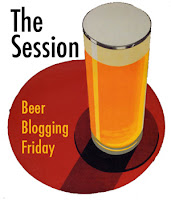 I’m posting this mainly to remind myself of the date, but some of you might be interested to know that the second Session will be taking place on Friday, April 6th. It’s being hosted by Alan at A Good Beer Blog this time around, and the style he’s chosen is dubbel.
I’m posting this mainly to remind myself of the date, but some of you might be interested to know that the second Session will be taking place on Friday, April 6th. It’s being hosted by Alan at A Good Beer Blog this time around, and the style he’s chosen is dubbel.
